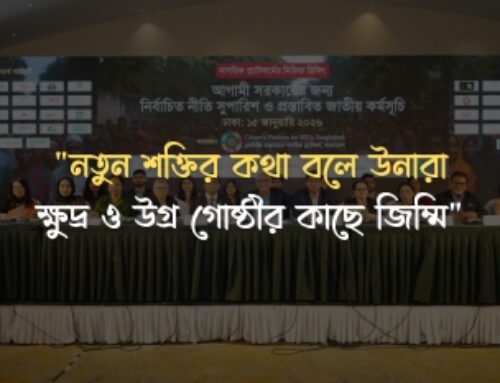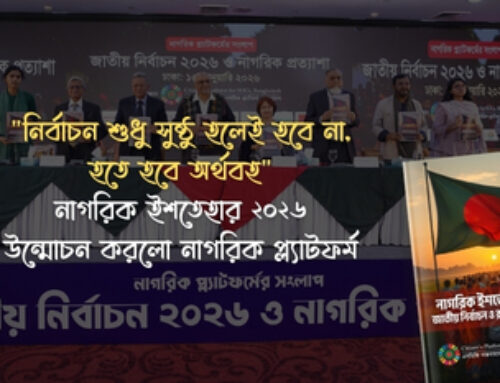
On 10 March 2025, the Citizen’s Platform for SDGs, Bangladesh; the Office of the Principal Coordinator for SDG Affairs, Chief Adviser’s Office, Government of Bangladesh and the United Nations Development Programme (UNDP), Bangladesh, jointly hosted the ‘VNR Consultation with the Youth’. The event was part of the government’s Voluntary National Review (VNR) preparation process, which includes a series of consultations with diverse stakeholder groups to ensure broader ownership of the Sustainable Development Goals (SDGs) delivery in Bangladesh. The inputs received from these consultations are expected to inform and shape the key messages for the VNR. The consultation with youth brought together around 100 representatives from diverse young communities in Bangladesh.
The welcome address was delivered by Ms Taranum Jinan, Network Focal Point for the Citizen’s Platform. She emphasised that the student-people uprising has created new opportunities for the country. She noted that previous VNRs largely represented government perspectives, rather than serving as inclusive national reports, as they did not reflect the voices of all relevant stakeholders, particularly marginalised communities. She underscored that this consultation aimed to learn about the youth’s perspectives regarding the implementation of the SDGs and the participation of youth in the VNR preparation process.
Before the discussion, a ‘Trigger Presentation’ was delivered by Ms Shourza Talukder, Research Associate, Centre for Policy Dialogue (CPD). In her presentation, she highlighted that youth (18-35 years) constitute 30 per cent of the total population. She added that youth is a diverse and heterogeneous community, including Indigenous communities, religious minorities, persons with disabilities, transgender individuals and youth who are not in education, employment, or training (NEET). She also shared insights into the social, economic, governance and environmental issues that the youth of Bangladesh have prioritised during the SDG era. She highlighted that youth have prioritised freedom of speech, voting rights and political participation over decent employment and quality education.
The presentation was followed by a ‘Live Polling and Priority Identification’ session with participants to identify the issues they consider most important. The key priorities identified through the poll were a) Quality Education and Skill Development, b) Climate Justice, c) Voice and Participation and d) Decent Employment and Entrepreneurship.

The participants were divided into four thematic groups to discuss the progress, challenges and recommendations related to the issues they had identified. Each group then presented their findings and insights during the presentation session.
The presenters from the ‘Voice and Participation’ team emphasised that the recent student-led uprising has highlighted the growing role of youth in utilising digital platforms to voice their opinions. They pointed to the social media-driven movement against rape as a prime example of this emerging trend. The presenters also addressed the challenges associated with voice and participation, noting issues such as limited public tolerance, inadequate tools and the absence of policies that effectively protect and uphold citizens’ voices. They recommended fostering knowledge and empathy, as well as ensuring journalistic integrity. Further suggestions included having youth representatives and dedicated roles for women in parliament. Additionally, they advocated for the establishment of student councils at private universities to promote the practice of free political expression. Alongside digital platforms, they recommended providing in-person options for expressing feedback, especially at the grassroots level.
The ‘Quality Education and Skill Development’ group reported that while primary education has seen improvements in recent years, challenges remain, particularly the lack of schools in remote areas, including the Chittagong Hill Tracts and climate change affected regions. They also noted that plans for quality education are often hindered by inadequate monitoring and implementation. Other concerns included the impact of political shifts on curricula and the lack of guidance and training for teachers to manage the changing curriculum. The group recommended career counselling, practical education, civic and moral education and greater collaboration between academia and industry. They also stressed the importance of ensuring accessibility for people with disabilities and promoting digital inclusivity for all.
The presentation on ‘Decent Employment and Entrepreneurship’ highlighted that young people are increasingly exploring outsourcing and corporate sector opportunities, alongside traditional government employment. The speakers emphasised the need to strengthen education at the grassroots level, promote youth inclusion in agriculture and ensure safe migration for low-skilled labourers. They also addressed the challenges faced by marginalised groups, such as Dalits, Adivasis, Hijras and people with disabilities, who often face difficulties in accessing work opportunities. The inability to secure Small and Medium Enterprise (SME) loans, along with institutional and legal barriers, were also identified as significant obstacles. To address these issues, they recommended continuing affirmative action for those in need and making recruitment processes more inclusive, particularly for people with disabilities. They also stressed the importance of creating employment opportunities for individuals without higher-level education, ensuring that everyone, regardless of qualifications, has access to work.
The ‘Climate Justice’ group highlighted significant progress in policy development, both globally and nationally, to address the impacts of climate change. The group emphasised the importance of prioritising funding and research in climate action, alongside the creation and implementation of inclusive policies. They identified accountability, transparency and maladaptation as the key challenges to effective climate action. Additionally, the group raised concerns that Bangladesh may face difficulties in securing climate funds following its graduation from Least Developed Country (LDC) status. To address these challenges, the group recommended establishing a formal mechanism for youth engagement, assigning them specific roles in climate action. They also advocated for inclusive funding models and the promotion of green entrepreneurship. In promoting climate-friendly actions, the group suggested involving artists in the process to help raise awareness and drive wider public engagement.

In the ‘Reflection and Wrap-up’ session, Mr Shihab Quader, Director General (SDG Affairs), Chief Adviser’s Office, Government of Bangladesh, expressed his gratitude to the participants and organisers. He echoed the sentiment of the discussion, stating that the aim is to make this review a national effort, rather than just a governmental one.
Mr Anowarul Haq, Assistant Resident Representative, UNDP Bangladesh, commended the inclusive VNR process and highlighted that ensuring accountability is the greatest challenge. He emphasised that accountability is also the key to transforming the recommendations into tangible actions.
Professor Mustafizur Rahman, Core Group Member, Citizen’s Platform and Distinguished Fellow, CPD, praised the priorities identified by the youth, adding that what matters more than the SDG report itself is the genuine concern young people have for the country’s future.
In his closing remarks, Dr Debapriya Bhattacharya, Convenor, Citizen’s Platform and Distinguished Fellow, CPD, emphasised that the future belongs to those who can adapt, innovate and lead. He posed a key question, “Are we truly preparing the next generation to drive Bangladesh’s economic growth while embedding sustainability at the core? Particularly in the areas of education (SDG 4), decent work (SDG 8) and climate action (SDG 13)?” He concluded by noting that the answers to these questions will determine whether Bangladesh progresses or lags in the race for an inclusive and sustainable future.





Leave A Comment